Products
Products
Optical table slide plate holder
An optical table slide plate holder from Harrick Scientific Products is designed to hold a sample slide plate mounted accessory. The plate holder reportedly can be used in most optical benches. It uses the three MetricM6 or English ¼-20 mounting holes. Harrick Scientific Products, Inc., Pleasantville, NY;
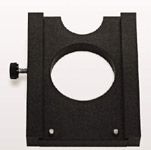
Cooling cartridge
A cooling cartridge from Harrick Scientific Products is designed for use with the company's high-temperature reaction chambers. The cartridges reportedly work with the company's diffuse reflection unit and most Raman microscopes. According to the company, the cartridge can be put in place of an existing heater and connected to a recirculating cooler–heater, allowing reaction chambers to operate with moderate cooling or heating. Harrick Scientific Products, Inc., Pleasantville, NY;
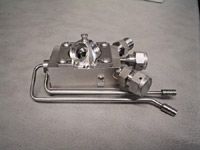
IR spectrometer
PerkinElmer's Spectrum Two compact IR spectrometer is designed to perform IR analysis on materials across a wide range of applications. The spectrometer reportedly is transportable and has optional wireless connectivity capabilities. According to the company, the instrument can be used to examine the quality of pharmaceuticals, polymer materials, hydrocarbon levels, lubricants, fuel analysis, and nutraceuticals. PerkinElmer, Waltham, MA;

Fiber-optic spectrometer
B&W Tek's Quest miniature fiber-optic spectrometer is designed for applications such as LED binning and sorting. According to the company, the instrument features a thermal drift spectrum of ~19 counts/°C typical, a readout speed of >2.0 MHz, and an optional RS232 communication interface. The spectrometer utilizes both a traditional crossed Czerny Turner spectrograph and an unfolded Czerny Turner spectrograph, which reportedly minimizes stray light in the UV region, and is equipped with a 2048-element linear CCD array, a built-in 16-bit digitizer, and an externally synchronized trigger. B&W Tek, Inc., Newark, DE;
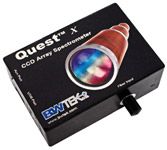
X-ray source
The 40-kV magnum reflection X-ray source from Moxtek is designed for high-resolution contrast imaging, quantitative XRF, and qualitative XRD. The source reportedly is capable of delivering a high-intensity flux of approximately 2×1011 photons/s/steradian/0.10 µA into a large solid angle of 45° at the full width half maximum. According to the company, the source has a focal spot of 300 µm, a maximum high-voltage potential of 40 kV, a beam current of 0.10 mA, a total power of 4 W, and a maximum power consumption of 7 W. The source operates on an input voltage of 7–10 V DC and is available with W, Rh, Cu, and Cr targets. Moxtek Inc., Orem, UT;
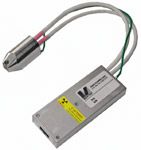
Temperature-control accessories
The Falcon accessories from Pike Technologies are designed to provide temperature control for quantitative analysis of liquid samples. According to the company, the NIR-UV–vis version can accommodate glass vials with diameters of 5–12 mm or 1–20 mm cuvettes, and the FT-IR version can accommodate a wide selection of demountable liquid cells and spacers. Both designs feature Peltier cooling and heating, and reportedly have ranges of 5–100 °C with accuracy of ±0.5%. Pike Technologies Inc., Madison, WI;
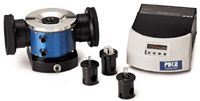
Mercury analyzer
The Model RA-3000F Gold+ mercury analyzer from Nippon Instruments Corporation is designed for EPA Methods 1631E and 245.7. According to the company, the instrument simplifies low to sub-ppt mercury analysis and reduces reagent consumption and wastes by as much as 80%. Nippon Instruments North America, College Station, TX;
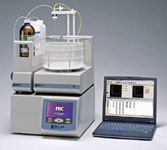
Fiber-optic spectrometer
Avantes' AvaSpec ULS fiber-optic spectrometer is designed to reduce stray light and increase both mechanical and temperature stability, particularly in applications where high absorbance parameters need to be measured, such as those associated with high chemical concentrations, high optical density, or long optical pathlengths. According to the company, the optical bench reduces stray light levels to 0.04% and strain sensitivity to microbending by a factor of 20. Avantes, Broomfield, CO;
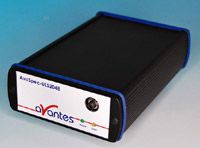
FT-IR sampling systems
FT-IR sampling systems from Thermo Fisher Scientific are designed to characterize the chemical composition of biological systems, such as lipids, in algae. According to the company, the sampling systems combine instrumentation, accessories, and software, increasing the number of samples that can be analyzed. The systems are available in four different configurations: ATR spectroscopy, transmission spectroscopy, reflectance spectroscopy, and infrared microscopy. Thermo Fisher Scientific, Waltham, MA;
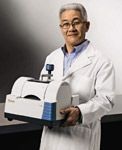
Nanocarbon analysis systems
Two DXR Nanocarbon Analysis Packages from Thermo Fisher Scientific are designed for the characterization and microcharacterization of carbon nanomaterials. According to the company, both packages offer large-scale chemical and materials producers complete systems for carbon nanotube analysis. Reportedly designed to simplify the Raman technique for nonspecialists, the packages consist of hardware, software, and sampling accessories, and provide information on the molecular structure and morphology of carbon nanomaterials. Thermo Fisher Scientific, Waltham, MA;
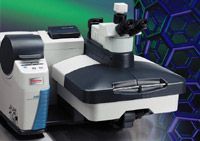
FT-IR spectrometer
Thermo Fisher Scientific's Nicolet iS5 spectrometer is designed to assist product assurance testing, basic troubleshooting, and chemistry teaching in FT-IR spectroscopy. The compact instrument, which reportedly delivers comparable performance to full-size spectrometers, has an open-architecture sample compartment that accepts a variety of sampling accessories. Thermo Fisher Scientific, Waltham, MA;
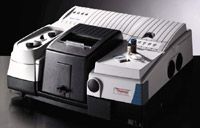
FT-NIR software
Horizon MB software from ABB Analytical Measurement is designed to assemble the tools for developing and deploying FT-NIR quality assurance (QA) methods. According to the company, the software deploys smart wizards that guide users in every topic, including chemometric models, library searching, QA method deployment, and regulated environments. ABB Analytical Measurement, Quebec, Canada;
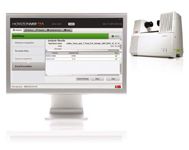
Cuvette holder
Quantum Northwest's t2 Peltier cuvette holder is designed as a temperature-controlled holder for nearly any UV–vis absorbance spectrophotometer. According to the company, the compact holder can be mounted in different instruments and permits rapid changes over a wide temperature range. The holder reportedly can be used for assays, DNA melting, and other applications in which absorbance is dependent on the temperature of the sample. Quantum Northwest, Liberty Lake, WA;
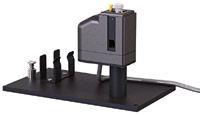
Search software
The FDM MultiSearch feature of Fiveash Data Management's FT-IR and Raman library search software is designed to allow users to search using as many as eight algorithms at once. Unlike spectral search programs that are limited to one algorithm at a time, the software feature reportedly allows users to study multiple hit lists at once. Fiveash Data Management, Inc., Madison, WI;
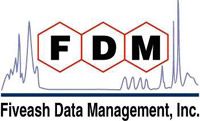
Mill
Retsch's Cyclone Mill TWISTER is designed to process small sample volumes of food, feed, and forage for NIR analysis. According to the company, the mill's grinding chamber and rotor design draws the sample into a collection bottle using a jet of air, reducing localized heat build-up. The mill reportedly grinds samples to 500 µm while preserving the sample's integrity. The mill comes with two sieve screens (2.0 and 1.0 mm) and has three rotor speed settings. Retsch, Inc., Newtown, PA;
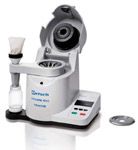
Dispersive Raman microscope
BaySpec's MovingLab dispersive Raman microscope is designed for analyzing liquid or solid samples at the point of sampling in the field. The portable instrument is supplied with an on-board swivel-notebook computer with a USB 2.0 output for an external PC or monitor. Optional 532-, 785-, and 1064-nm excitation wavelengths are available. BaySpec, Inc., San Jose, CA;
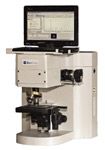
FT-NIR analyzer
The MPA multipurpose FT-NIR analyzer from Bruker Optics is designed for the analysis of liquids, solids, powders, and tablets. The analyzer's transmission head reportedly can be combined with an autosampling unit and optional tablet holders. According to the company, the analyzer can be connected via Ethernet to a laptop computer and can be placed on a utility cart. Permanent online diagnostics reportedly monitor the instrument continuously and advise users of any problems. Bruker Optics, Inc., Billerica, MA;
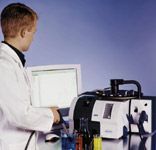
Optical filters
Optical filters designed with sputtered coatings are available from CVI Melles Griot. The narrowband, broadband, and edge filters for fluorescence, microscopy, flow cytometry, and image processing reportedly provide 5-6 OD blocking and maintain a transmission of greater than 98%. According to the company, standard and custom designs are available. CVI Melles Griot, Carlsbad, CA;
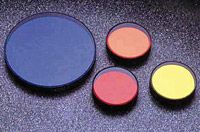
Portable Raman analyzer
The EZRaman-I-9 portable Raman analyzer from Enwave Optronics is designed to minimize fluorescence for the analysis of difficult-to-measure samples. According to the company, the analyzer provides longer excitation wavelength above 900 nm. Enwave Optronics, Inc., Irvine, CA;
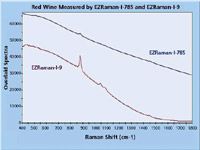
Raman microscope
Renishaw's inVia Raman microscope can be used for nondestructive testing of sperm DNA for assessing the healthiness of sperm cells. The instrument can be customized to integrate optical tweezing, which enables researchers to immobilize sperm cells with a tightly focused laser beam. The resulting Raman spectra contain information about the vibrations of molecules within the sperm cells and can be used to assess the state of its DNA. Renishaw, Hoffman Estates, IL;
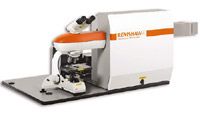
DNA quality control standard
Starna's DNA quality control standard is provided in a 1.5-mL liquid vial that offers the DNACON 260/280 reference material in format suitable for use in drop technology systems. The vial reportedly is produced in an ISO 17025 and ISO Guide 34 accredited environment and provides a NIST-traceable quality control standard. According to the company, the concentration is matched for use with ultralow volume and short-pathlength measurement systems. Applications include DNA purity evaluations in clinical and bioscience laboratories. Starna Cells Inc., Atascadero, CA;
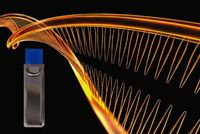
UV–vis–NIR miniature spectrometer
The VS7000 UV–vis–NIR miniature spectrometer from HORIBA Jobin Yvon is a preconfigured, low stray light system that includes an uncooled back-illuminated CCD and USB-2 integrated electronics. The spectrometer is designed for OEM low light, high SNR requirement applications. The instrument also includes a selection of slit widths, integrated OSF, and three spectral range selections: 200–860, 380–750, and 200–1050 nm. HORIBA Jobin Yvon, Inc., Edison, NJ;
www.horiba.com/scientific/VS7000
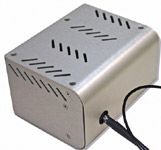
Topographic Raman imaging
WITec's True Surface Microscopy imaging mode is designed to allow large-area topographic coordinates from the profilometer measurement to be precisely correlated with the large-area confocal Raman imaging data. This option reportedly enables samples that would normally require extensive preparation to obtain a certain surface flatness to be automatically characterized as they are. According to the company, it allows scan ranges as large as 50 mm × 100 mm with a spatial resolution of 100 nm vertically and 10 µm laterally. WITec GmbH, Ulm, Germany;
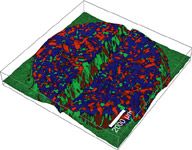
MS system
The LCMS-8030 triple-quadrupole MS system is designed to be coupled with an UHPLC system for detection of peaks having widths of 1 s. The system reportly provides a polarity switching time of 15 ms. According to the company, the system's desolvation line can be maintained without breaking vacuum. The system can be combined with the company's Nexera UHPLC system for automated optimization of analytical conditions for quantitative target compounds and unattended overnight operation. Shimadzu Scientific Instruments, Inc., Columbia, MD;
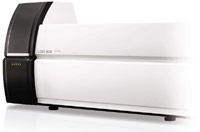
Certified reference materials catalog
SPEX CertiPrep's 2011–2012 catalog of certified reference materials includes more than 4000 organic and inorganic reference materials and standards. The catalog lists reference materials for inorganic analysis by ICP, ICP-MS, IC, AA, XRF, and ion-selective electrode and organic analysis by GC, GC–MS, HPLC, and LC–MS. The catalog also includes consumer safety products designed for the analysis of phthalates in polyethylene, heavy metals in plastic, and RoHS/WEEE compliance samples. More than 100 PCB congeners are also listed. SPEX CertiPrep, Metuchen, NJ;
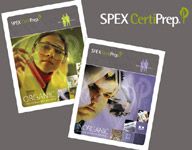
Fuel analyzer
Bruker Optics' FUELex portable jet and diesel fuel analyzer is designed to analyze as many as 13 fuel properties in less than 3 s. The analyzer, which uses a fiber-optic dip probe, reportedly does not consume fuel or require special sample preparation. According to the company, the analyzer can monitor changes in jet and diesel fuel quality, with sample type capabilities including Jet A, Jet A-1, JP5, JP8, Diesel, and Diesel 1. Bruker Optics, Billerica, MA;
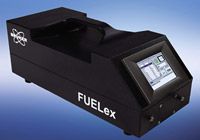
ICP-MS system
The NexION 300 ICP-MS system from PerkinElmer is designed for parts-per-trillion detection of trace elements. According to the company, the system reduces the need for daily user maintenance and cleaning. The instrument reportedly provides three modes of interference removal: standard, collision, and reaction. The modes are designed for routine analyses, semiquantitative analyses, and analyses of difficult elements and matrices, respectively. PerkinElmer, Inc., Waltham, MA;
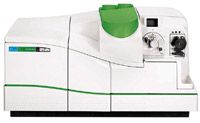
Silicon drift detector
The Super SDD silicon drift detector from Amptek is designed for high-count rate applications in hand-held systems and bench-top analyzers. The X-ray detector, preamplifier, and cooler system reportedly are thermoelectrically cooled. The input FET and a feedback circuit are mounted on the detector's two-stage cooler and are kept at approximately -55 °C. According to the company, the 25 mm2 × 500 µm detector provides an FWHM resolution of 127 eV, a peaking time of 11.2 µs, and a peak-to-background ratio of 8000. Amptek, Inc., Bedford, MA;
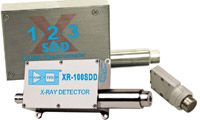
Calibration standards
Hellma's liquid and glass calibration filters are designed for testing spectrophotometers. The company has announced accreditation for the calibration standards according to DIN EN ISO 17025. According to the company, the accreditation ensures the traceability of calibrations carried out to references of NIST, by which an international correlation of measurement results is enabled and laboratory procedures gain greater transparency and improved protection of measurement results. Hellma USA, Inc., Plainview, NY;

Raman system
The LabRam HR Raman system from Horiba Scientific is available with an ultra-low-frequency (ULF) that enables measurements of Raman spectra with shifts as low as 5 cm-1 relative to the exciting laser line. According to the company, the system can be used to determine chain lengths in polymers and differentiate similar crystal forms (polymorphs) in pharmaceutical products, among other applications. Horiba Scientific, Edison, NJ;
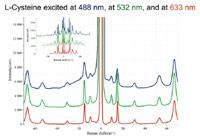
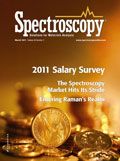
Newsletter
Get essential updates on the latest spectroscopy technologies, regulatory standards, and best practices—subscribe today to Spectroscopy.
The Rising Role of Near-Infrared Spectroscopy in Biofuel Innovation
July 25th 2025A new bibliometric study published in Infrared Physics & Technology highlights the growing global impact of near-infrared (NIR) spectroscopy in biofuel research, revealing key trends, contributors, and future directions for advancing sustainable energy solutions.
Best of the Week: The Emerging Leader in Molecular Spectroscopy, Big Pharma’s Manufacturing Shift
July 25th 2025Top articles published this week include a feature article about big pharma’s investments in U.S.-based manufacturing, an article about the 2025 Emerging Leader in Molecular Spectroscopy Lingyan Shi, and some news items detailing the winners of the Coblentz Society’s student awards.